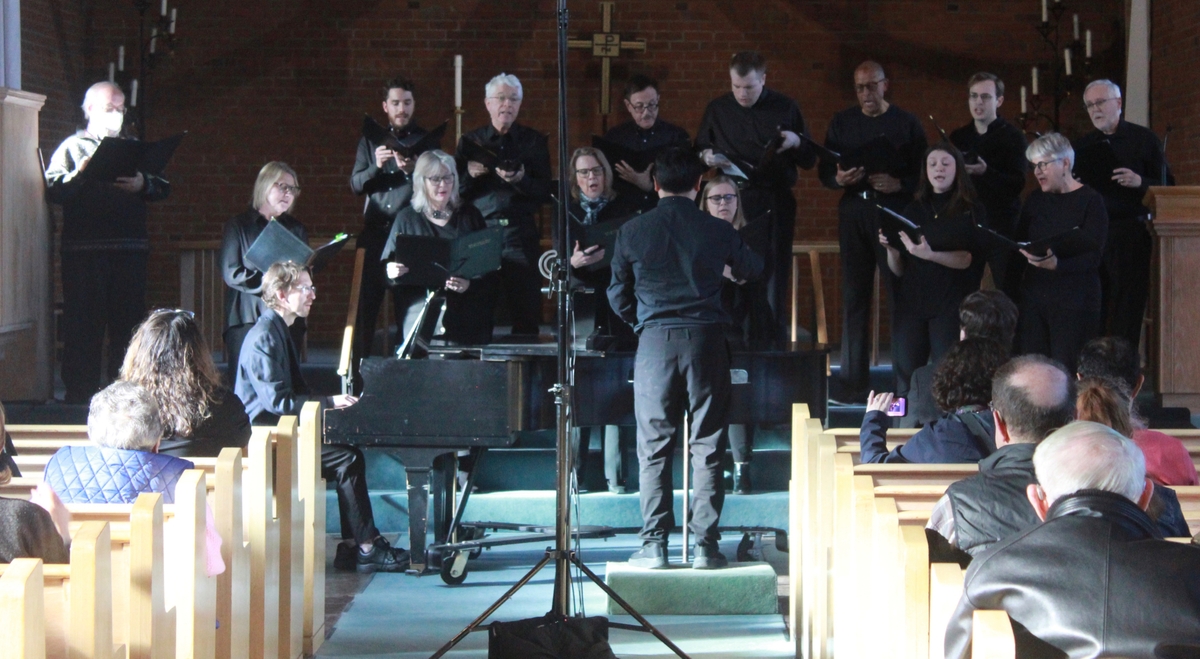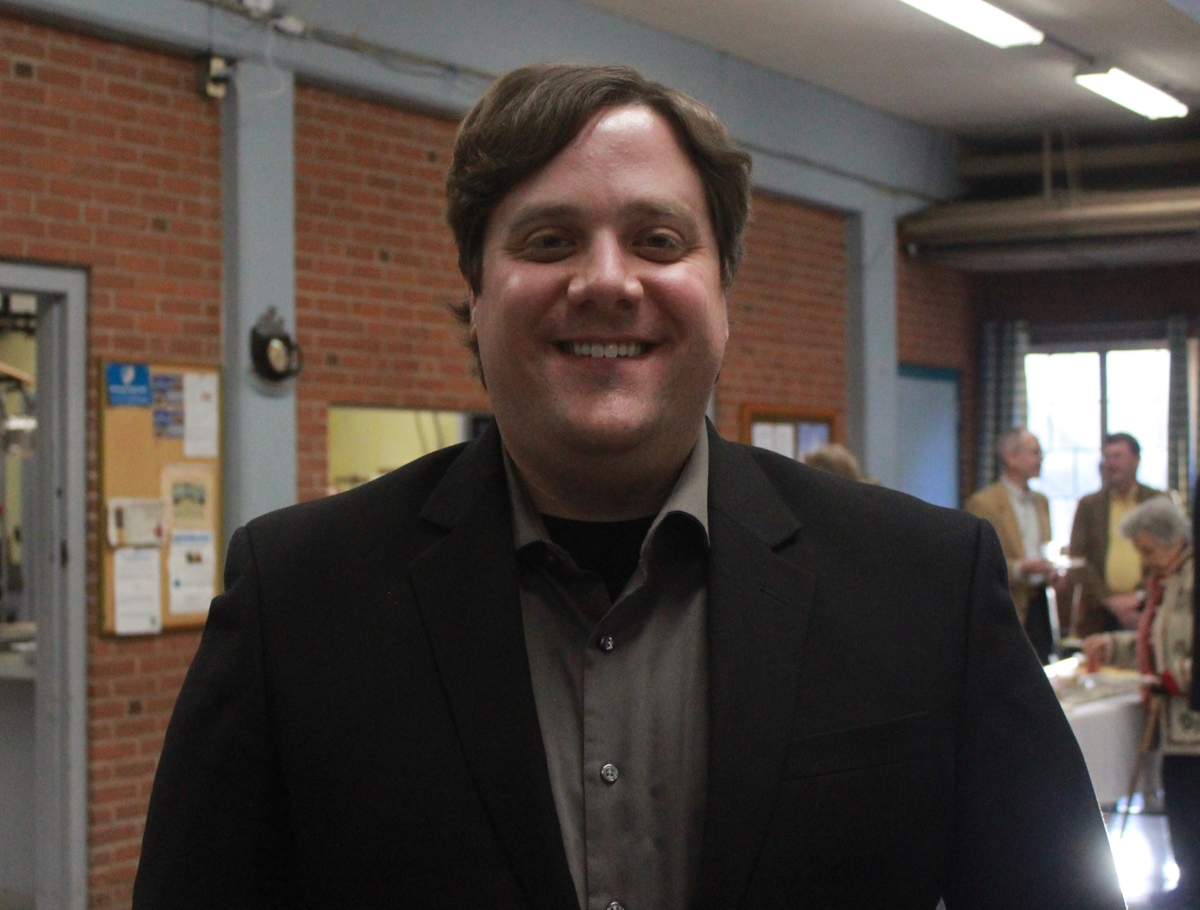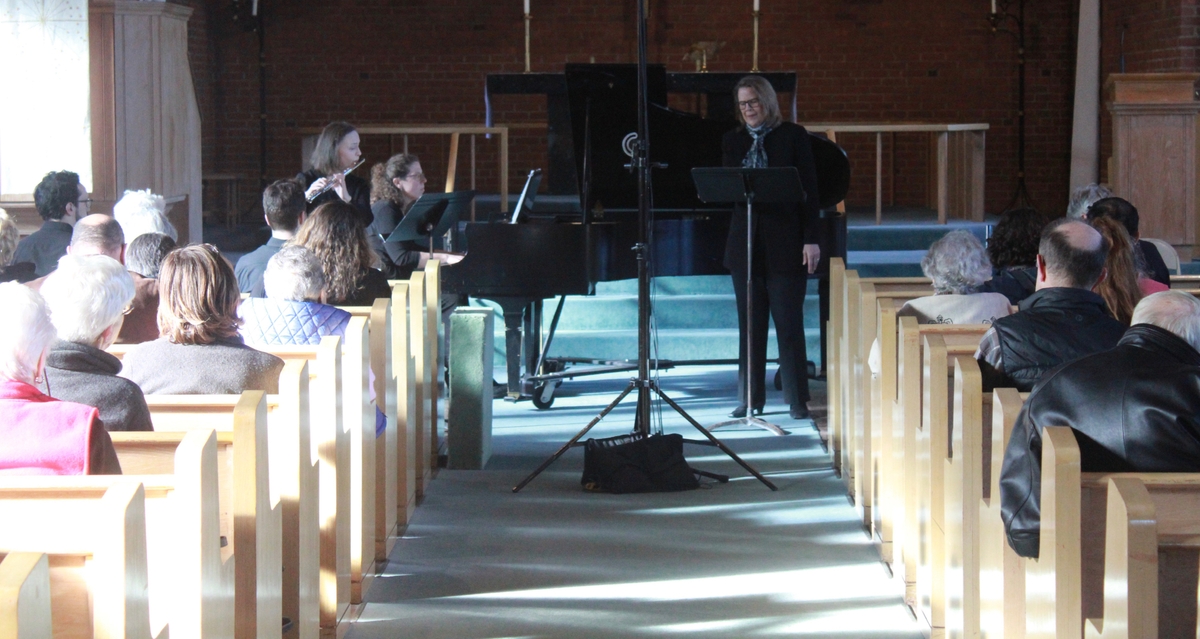
Brian Slattery photo
Voices filled the space of Bethesda Lutheran Church on Sunday afternoon, raised in song. But the harmonies weren’t what many may have been used to in a church; they were sharper, more angular, provoking of thought. Nor was the text from the Bible; it was a dispatch from halfway around the world, from the present day.
“We sense something grave is happening around us. We don’t know what the future holds,” the choir sang. “The land we tilled for generations is shrinking; salt water poisons what’s left of our fields. Many people have gone, displacement and death everywhere.”
The piece was part of “Living Between the Tides,” a program of works by composer Martin Hebel that was also the latest installment in the Bethesda Music Series, run out of the church at 450 Whitney Ave. The series started about 30 years ago. Its mission: “through the making of music and presenting of music, to offer financial assistance to nonprofits and social service organizations in the greater New Haven area,” said Margaret Astrup, chair of the Bethesda Music Series Committee and a singer and professor of music at WestConn.
In the past they have partnered with Downtown Evening Soup Kitchen, Habitat for Humanity, and Christian Community Action, and “we have had a longstanding relationship with IRIS,” that is, Integrated Refugee and Immigrant Services. The music ranges from “Bach to bluegrass, to steel drums and jazz, to the Fauré Requiem.”
Bethesda puts on four to five concerts a year. The concerts are free, though people can donate, with all the proceeds going to the beneficiary organization in question. At the end of the year is a musical service at Bethesda, the proceeds from which fund next year’s concert series.
The Hebel concert, set to benefit IRIS, was also “an opportunity to have one of our own present his music here” — as the series did last year with composer Chris Lee.

Hebel.
Martin Hebel was born in Yale-New Haven Hospital. “I’m a triplet,” he said — an in vitro fertilization (IVF) baby from Yale’s breakthroughs in the procedure in the 1990s. He grew up in Hamden, went to Spring Glen Elementary and Wintergreen, Foote School for middle school, and then Hamden High School. As an undergraduate at UCONN, “I learned that you could be a composer at all,” he said. He finished there in 2009 with degrees in composition and trumpet performance, then went on to get a masters and doctorate at University of Cincinnati College-Conservatory of Music (CCM). Since then he has been composing and teaching at a number of universities, most recently SUNY Binghamton. But “I’m back in Hamden frequently,” he said. “All of my family lives here.”
His family members were and are parishioners at Bethesda. Astrup has “known me since I was born,” Hebel said. He grew up attending the music series, and “it’s really a joy to come back as a professional,” he said. Moreover, Sunday’s concert was a “family affair,” as Hebel put it, as his father and brother, as well as Astrup’s son — all trained vocalists — were in the choir.
The concert was an apt introduction to Hebel’s work, as it presented several chamber pieces with mixed ensembles of strings, piano, and brass, in addition to the choral piece at the end receiving its world premiere. All of them, however, fell under the umbrella of what Hebel called “socially conscious composition,” or “music which engages some global challenge in some way.”
For Hebel, one of the roles of music in social causes is “to be something of a social mirror — to illuminate those most affected and connect the community we’re part of.” Hebel’s compositions have addressed armed conflict, climate change, and human displacement, and “the piece that was commissioned for today’s concert engages climate change from the human perspective,” Hebel said.
The text of that choral piece is a collage of firsthand accounts of climate refugees from Bangladesh and Eastern India, which Hebel gathered from texts and videos. He paraphrased from those sources to create a narrative. The idea was to explicitly connect to IRIS’s mission. But it’s also part of a larger ongoing project Hebel is working on called Uplifting Unheard Voices, about refugees more broadly. This project began in 2019 when he received a grant from the Presser Foundation to travel to Rome and interview refugees from Africa and the Middle East heading into other parts of Europe. He was still transcribing those interviews in Cincinnati when the war in Ukraine created another flow of refugees. In all, he interviewed dozens of people across nine different languages.
Astrup noted that Hebel’s music, like that of many contemporary composers, “is not easy to perform. Sometimes it’s not easy listening, for that very reason. But it definitely has something to say.” She was drawn in by the texts themselves, which she found “very profound.”
“It’s all connected around this goal of using music as a tool to highlight and give a stronger voice to people I feel I can help with what little power I have as a measly composer,” Hebel said.
He has no problem with composers writing from their own experience, or writing music for music’s sake. But for himself, he said, “I find myself to be a rather boring subject,” and “it seems much more meaningful to me and more valuable.” Besides, he observed, “all the things you’re interested in, in music and in life, are interconnected in some way.”
On Sunday, Sami Niazai, ambassador program manager at IRIS, gave the audience a brief overview of the services the organization provides in resettling refugees, from navigating immigration cases to finding housing and employment to ushering people through the various public services the U.S. has. “There is limited support from the government” for the work, Niazai pointed out; instead, he said, indicating the audience, it comes from “people like you.”
The program of Hebel’s music began with “Serenity,” featuring Tom Hudson on cello, Zachary Haas on bass trombone, and Isaac Lee on piano. The piece, meant to evoke “the spirit and natural beauty of Appalachia,” did so quite successfully by drawing its open, pentatonic character from Appalachian music without falling into the same kinds of easy traps that, say, Aaron Copland did. Rather than lifting melodies from traditional music nearly whole cloth, Hebel instead used the idiom to create melodies of his own, creating something nearly hymnlike for the piece’s first section, developing it into something more complex and ultimately sprightly, and then returning home. The unusual instrumentation, pitched low, made the melody feel stately and grounded, while the piano sketched in the world around the two voices.
Hebel mentioned that after writing his third symphony he wanted to try something that was nearly opposite, creating “Cloud Forms” and “Wind Harp,” two pieces for solo flute, performed by Kerry Walker. In the first piece, spacious phrases with a little chromaticism lended an air of ambiguity, even as it was clear they were headed, deliberately, in a certain direction, blown by a steady wind. A moment of greater urgency arrived, sounding like a sudden burst of rain. “Wind Harp” came on more rangy and urgent, sending Walker to the top and bottom of her instrument. It was playful and ominous at the same time.
“Beneath the Seams” returned the concert to Appalachia, this time to explore the depredations of the coal industry with text drawn from interviews with miners — men and children — who talked about the dangers they faced and the friends and family they lost. Hebel expertly wove together the similarly ranged instruments of tenor and bass trombone (Anna Franz and Zachary Haas) and baritone (Dan Satter). Sometimes the three voices melded together. Sometimes they clashed, often giving the sense of the horns as the earth, trying to swallow the singer whole, and the singer just barely keeping one step ahead.

For “Mother of Exiles,” Hebel juxtaposed the famous Emma Lazarus poem “The New Colossus” with May Wedderburn Cannan’s poen “August 1914” about a soldier dying in World War I to explore the phenomenon of immigrants arriving in the U.S. only to then join the armed forces to make ends meet, contributing to some of the conflicts that they might have fled from in the first place.
The piece began with unsettled piano (Laurel Larson) providing the ground for a flute (Kerry Walker) to skitter over, as if unsure of where to land. Astrup, solo soprano here, navigated the trickier passages with ease. This was the tone of the Cannan texts; when the piece switched to Lazarus, the music came together in what felt like a corrosive triumph, the hopeful message of immigration dented by the awareness of what awaited so many when they got here.
“Vivid Blue,” a solo piece for piano (Laurel Larsen), drew its inspiration from contemplation of a fragile ecosystem. Hebel’s exemplified a delicate balance, as ascending lines unfurled with crystalline beauty only to tumble down into murkiness.
It was the right segue into “Between the Tides,” featuring the Bethesda Choir directed by Isaac Lee. The text detailed the destruction of a village by flooding, a subject Hebel’s music made the listener feel without being didactic about it. Lines passed from section to section acted as a small overture. Then a soprano (Astrup) emerged as a storyteller, backed up by a chorus that swelled around her. As the story detailed the village’s demise, voices piled atop voices, creating rich, dense harmonies that accurately carried the singers’ sense of uncertainty for the future. Sharp harmonies were deployed to describe the aftermath. It all led to an ending that felt entirely earned.
“There is still time, still hope if we act now,” the line read. The music wrung enough irony out of that to drive home how conditional the if in that sentence was; if that concerned us, maybe the we in the text shouldn’t just be the villagers, the victims of climate change, but us, the audience, listening to what they had to say.
The next Bethesda Music Series concert is May 19, a jazz service at 9:30 a.m. Visit the church’s website for more information.
Thanks for reviewing this concert. More reviews of choral music, please!